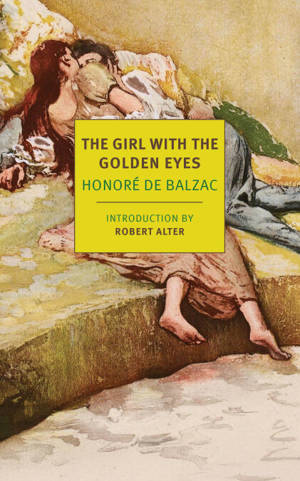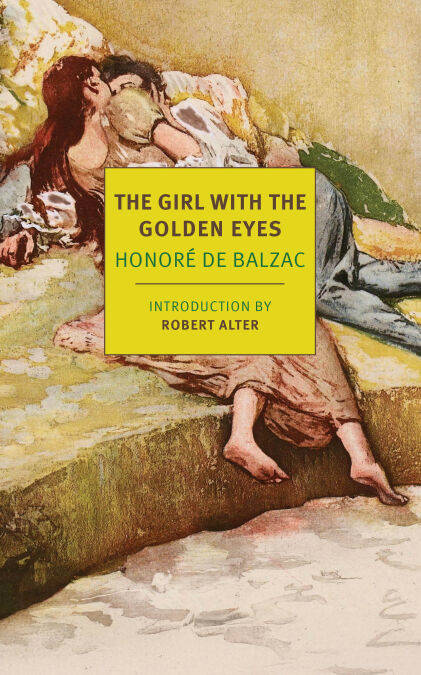
Bedankt voor het vertrouwen het afgelopen jaar! Om jou te bedanken bieden we GRATIS verzending (in België) aan op alles gedurende de hele maand januari.
- Afhalen na 1 uur in een winkel met voorraad
- In januari gratis thuislevering in België
- Ruim aanbod met 7 miljoen producten
Bedankt voor het vertrouwen het afgelopen jaar! Om jou te bedanken bieden we GRATIS verzending (in België) aan op alles gedurende de hele maand januari.
- Afhalen na 1 uur in een winkel met voorraad
- In januari gratis thuislevering in België
- Ruim aanbod met 7 miljoen producten
Zoeken
€ 15,72
+ 15 punten
Uitvoering
Omschrijving
In this influential novella, regarded as one of Balzac’s greatest works, a dissolute aristocrat competes with a shadowy rival for the love of an enigmatic golden-eyed woman—a crazed and annihilating conflict that plays out in the most darkly decadent corners of Parisian high society.
A handsome, brilliant, consummate hedonist, Henri de Marsay believes in neither man nor woman, neither God nor the devil. He believes in Paris, a city of decadence and sin, a city where every passion is resolved into gold or pleasure.
From the first moment Henri catches sight of the girl, he is infatuated. And so is she. Though closely guarded by a stern chaperone, she manages to brush against him in the street and squeeze his hand. Desperate for another glimpse of this "woman of fire," Henri returns every day to where he last saw her until he learns her name, Paquita Valdes, and her address, a forbidding mansion on the Rue Saint-Lazare protected by vicious dogs. Penetrating this palace becomes Henri's obsession. He makes elaborate plans and enlists the help of a secret society, the Devorants, but when at last he enters, he learns a bitter truth not only about the girl but about his own half-sister. His erotic quest ends in bloodshed.
The Girl with the Golden Eyes is one of the most memorable and fantastic episodes in Balzac's Human Comedy—its dark vision of Paris and human sexuality an inspiration to Oscar Wilde in Salomé and to Marcel Proust, whose Baron de Charlus praises its author for his knowledge "even of those passions which the rest of the world ignores, or studies only to castigate them."
A handsome, brilliant, consummate hedonist, Henri de Marsay believes in neither man nor woman, neither God nor the devil. He believes in Paris, a city of decadence and sin, a city where every passion is resolved into gold or pleasure.
From the first moment Henri catches sight of the girl, he is infatuated. And so is she. Though closely guarded by a stern chaperone, she manages to brush against him in the street and squeeze his hand. Desperate for another glimpse of this "woman of fire," Henri returns every day to where he last saw her until he learns her name, Paquita Valdes, and her address, a forbidding mansion on the Rue Saint-Lazare protected by vicious dogs. Penetrating this palace becomes Henri's obsession. He makes elaborate plans and enlists the help of a secret society, the Devorants, but when at last he enters, he learns a bitter truth not only about the girl but about his own half-sister. His erotic quest ends in bloodshed.
The Girl with the Golden Eyes is one of the most memorable and fantastic episodes in Balzac's Human Comedy—its dark vision of Paris and human sexuality an inspiration to Oscar Wilde in Salomé and to Marcel Proust, whose Baron de Charlus praises its author for his knowledge "even of those passions which the rest of the world ignores, or studies only to castigate them."
Specificaties
Betrokkenen
- Auteur(s):
- Vertaler(s):
- Uitgeverij:
Inhoud
- Aantal bladzijden:
- 112
- Taal:
- Engels
Eigenschappen
- Productcode (EAN):
- 9781681379074
- Verschijningsdatum:
- 30/06/2025
- Uitvoering:
- E-book
- Beveiligd met:
- Adobe DRM
- Formaat:
- ePub

Alleen bij Standaard Boekhandel
+ 15 punten op je klantenkaart van Standaard Boekhandel
Beoordelingen
We publiceren alleen reviews die voldoen aan de voorwaarden voor reviews. Bekijk onze voorwaarden voor reviews.









